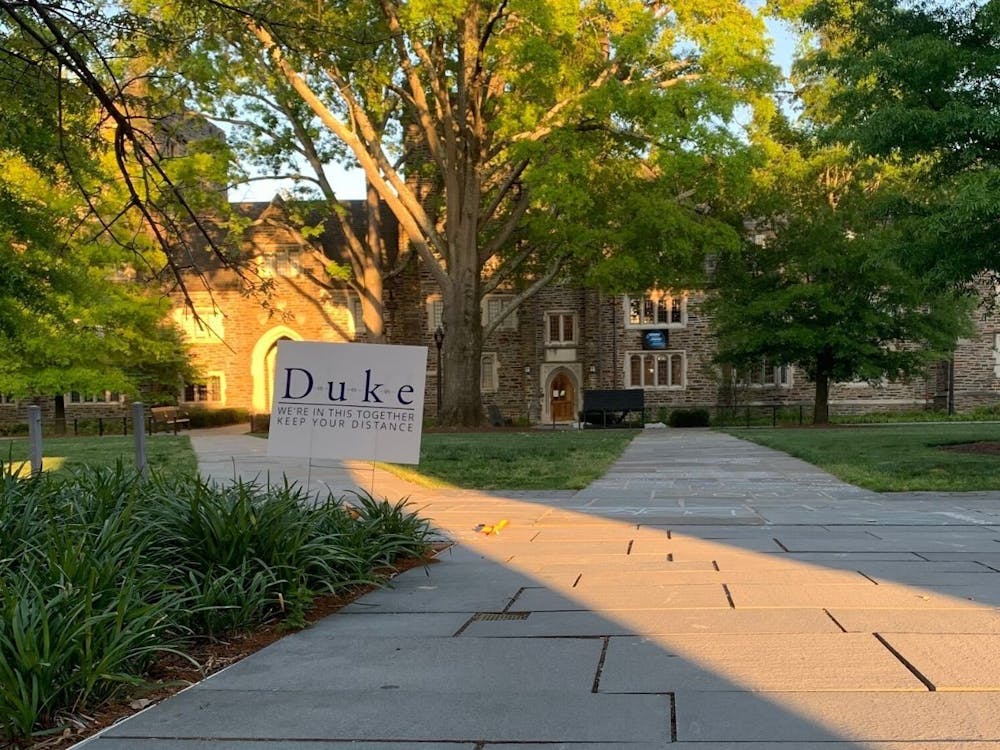Students have mixed opinions about the early plan for a return to campus that President Vincent Price announced May 29.
Their feedback ranges from excitement about the opportunity to once again learn alongside friends to doubts about students’ abilities to obey safety guidelines.
The early plan for the upcoming academic year, subject to change based on public health guidelines, includes an altered academic calendar with fall and spring breaks eliminated in favor of shorter semesters, as well as accommodations for students who choose not to or are unable to return to campus.
Multiple students expressed approval of the plan, arguing that Duke made the best decision possible given the difficult circumstances.
“I think it’s a great, well-thought-through plan. I think it’s very important that students come to campus,” sophomore Alex Burgin said.
Sophomore Morgan DePrizio echoed Burgin’s sentiment, writing in an email: “I think the plan is very appropriate, considering the unpredictable nature of the virus.”
Safety concerns
Some students had concerns about the safety risks posed by living and working in close quarters with large numbers of people, though they were personally glad that they’d be heading back to Durham.
“I’m not sure if it makes sense from a public health standpoint,” said sophomore Ryan Chang, who is from Taipei, Taiwan, recalling an article he read that argued that colleges should remain closed until 2021.
“As a freshman, though, college has been an amazing experience in-person,” Chang added. “I think doing classes online was definitely worse from an academic and social point of view, and I don’t think there’s really too much you can do to improve the online experience. So from a student’s perspective, I’m glad that we will have an on-campus option in the fall.”
Gary Bennett, vice provost for undergraduate education, wrote in an email that “our foremost consideration this fall will be protecting the health of our campus community.”
“We review our safety protocols (e.g., social distancing, symptom monitoring) frequently, relative to [the] changing nature of the pandemic, emerging empirical evidence and state/national guidance,” Bennett wrote.
He added that Duke would describe fall safety policies in “a few weeks.”
Students had varied opinions regarding their classmates’ abilities to follow the safety regulations that Duke plans to put in place.
Rules outlined in Price’s email include requiring physical distancing and masks in classrooms and public settings. Students, faculty and staff will have to complete daily health checks through an app and students will be expected to remain in the Durham area during the semester.
“I find it a little hard to trust that Duke students will go an entire semester without going to a party… knowing how lively our campus culture is,” sophomore Ila Amiri wrote in an email. “Part of me is hopeful, though, that everyone will see the danger in not following the policies and do their best to be responsible.”
Senior Yash Patil said that he did not think regulations put in place by Duke would be effective.
“I honestly don’t think social distancing will work on campus. It’s not going to work at all,” he said.
Patil added that although he believes Duke will enforce safety policies as best as possible, “[the University] just physically can’t monitor every single student.” He also worries that students might leave Durham without reporting their travel or quarantining in their dorm rooms upon return.
Burgin disagreed, trusting most of his classmates to follow the rules that are put in place.
“I think, by and large, people at Duke will respect these policies,” he explained. “I’m sure there will be outliers, but mostly students will experience positive peer pressure to do the right thing and stay safe.”
DePrizio, who expressed that she does not trust that all Duke students will follow safety guidelines, wrote that she anticipates feeling unsafe on campus and hopes that students will strongly consider not returning to campus if it isn’t necessary.
“I think that [Price] has somewhat insinuated that it is not necessary to return to campus if you don’t want to/can’t. I think Duke students are going to ignore that simply because they want to be reunited with their friends. I think if that’s part of someone’s decision to return to campus, they shouldn’t! We should try to minimize the number of people on campus. I kind of hope, depending on the pandemic situation, Duke releases a statement encouraging students to stay home if they can,” she wrote.
In his email, Price wrote that Duke will accommodate students who choose not to come to campus, return home or are quarantined, allowing them to “engage in a full curriculum of courses.”
DePrizio wrote that for her part, she feels she needs to return because she comes from “a background situation where [she] cannot function properly at home” and cannot afford to pay rent to live on her own.
Considering gap semesters
Some students also mentioned considering doing their fall classes online or taking a gap semester.
Patil, a computer science major, began considering a gap semester to complete an internship before Price’s announcement, having assumed that all classes would be online. However, even now that early plans to return in the fall have been made public, he is still considering taking the semester off.
“Even if we will be on campus, the educational experience will still be compromised. It’s not going to be as dynamic as it is when we’re on campus. You know, going to [the Broadhead Center], just talking to friends—it’s all going to be very different, regardless of what people say,” Patil said.
Patil thinks that his decision is particularly difficult to make as a senior, both because he feels that there is a pressure to graduate on time and because taking a gap semester would mean graduating without many of his closest friends.
Chang, on the other hand, said that if Duke announces that tuition for an all-online semester will be significantly less expensive than the standard tuition, he may consider completing the semester remotely. Part of his decision may depend on what his friends choose to do.
The difficulties of online learning
Several students expressed concerns that they would have to take online classes while living on campus, but still think that they will be able to learn more effectively on campus.
Angikar Ghosal, a sophomore, said that he believes most lecture classes can be transitioned online fairly effectively, but lab classes will be negatively impacted by online learning formats.
“I’m a [teaching assistant] for some of those classes and I can tell you, doing labs online is not the same as doing them with your own hands,” Ghosal said.
Burgin said that even if he has to take some of his classes fully or partially online, he thinks just being on campus will facilitate a better learning experience.
“At Duke, you have students right next to you who you can bounce ideas off and study with. Having everyone close by creates great interaction, which I think is especially important for academics,” he said.
Amiri wrote that even having a few of her classes in-person would “make a world of difference and, being from California, being in the correct time zone would be very helpful.”
Students generally felt that campus culture will be quite different in the fall, from a lack of parties to a less vibrant extracurricular scene.
“I think the tone on campus will be a lot more somber, and there will be at least some impact on social life. Big performances, parties, going to basketball games—all of that will probably not happen in the fall. Even when things do happen, there will probably be strict social distancing guidelines for audiences, which will make things less fun, less exciting,” Chang said.
Amiri agreed, writing that “it is a huge adjustment and we, as Duke, will have to change the way we interact and connect.”
Despite their doubts, many students said that they thought Duke’s decision was appropriate and that they look forward to returning to Durham.
Burgin expressed that quarantining at home has been difficult for his mental health.
“Over the past year or so, my friends have been my safety net, my support system, and things get difficult when people are separated by thousands of miles, especially with all this turmoil that's happening in the world. Everyone's stressed, everyone's anxious, but we're not together, so we kind of withdraw into our own selves,” he said.
“I think mental health is a part of safety, in many ways. We have to look at it holistically. Health is not just physical; it’s also mental, emotional, and I think having people together is the starting point,” Burgin said.
Get The Chronicle straight to your inbox
Signup for our weekly newsletter. Cancel at any time.

Anna Zolotor is a Trinity senior and recruitment chair for The Chronicle's 118th volume. She was previously news editor for Volume 117.

